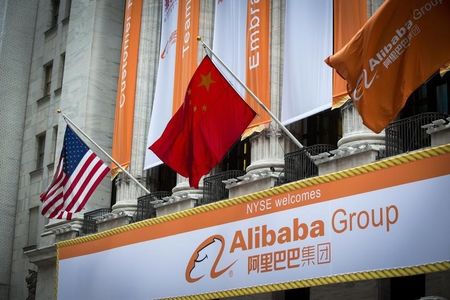By Nivedita Bhattacharjee
MUMBAI (Reuters) - Kunal Bahl, co-founder of Indian online marketplace Snapdeal, has come a long way from his days as a business school student selling detergent in U.S. supermarkets.
After final negotiations over a sushi breakfast earlier this month, Snapdeal on Tuesday unveiled a $627 million (388.60 million pound) investment from Japan's SoftBank (T:9984), one of the high-profile early backers -- and now major shareholder -- in China's Alibaba (N:BABA).
The deal marks the largest single investment in an Indian e-commerce firm to date. For Bahl, who has often said he aims to lead "India's Alibaba", it is a stamp of approval for Snapdeal's strategy and its decision to remain a market, not a retailer.
"This investment means a lot more than the capital that it brings. It brings validation," the soft-spoken executive said.
Snapdeal competes with bigger rivals Flipkart.com and Amazon.com (O:AMZN), the latter building a growing presence in India, where e-commerce is expected to grow from $2.3 billion in 2014 to $32 billion by 2020, according to consulting firm Technopak.
Bahl, 31, said Snapdeal, which already counts eBay Inc (O:EBAY) among its shareholders, struck the deal with SoftBank after months of talks with CEO Masayoshi Son and Nikesh Arora, who was with Google (O:GOOGL) and is now vice-chairman at SoftBank Corp.
"Some of these things are just serendipity," Bahl said. "I met Nikesh sometime back just as he was about to join Softbank. He played a very key role in making this partnership work."
The face of Snapdeal, Bahl studied in the United States and co-founded a detergent company there. He worked for Microsoft (O:MSFT), but then headed back to India.
Back home, he teamed up with high school friend Rohit Bansal. They set up a daily deals site which quickly morphed into India's No.3 e-commerce player, now estimated to be worth about $2 billion.
A trip to China convinced Bahl to make his company a marketplace, one that would simply provide an online platform.
"That's why Softbank invested. They understand the Alibaba model really well. And they saw that in the Indian context we are closer to that model than anyone else," Bahl said.
And as for the cash? Bahl says it will be spent on improving supply chains and logistics.
Smartphones and the Internet have led to a boom in ecommerce activity in India, but the rate of growth is still slower than that of China.
Traffic-infested roads and weak infrastructure in the country complicate online sales and deliveries. Companies, desperate to avoid road snarls and railway delays often have to fly their packages to their destinations and have to invest heavily in their own supply chains to meet their delivery dates.
Snapdeal is likely to spend around $250 million in sprucing up its back office, hiring more engineers and teaming up with start-ups to strengthen the company's mobile offers.

"Don't expect anything drastic from us, we are never the ones who do drastic things," Bahl said. "We do a few things at a time."
(Editing By Clara Ferreira-Marques and Jane Merriman)
2_800x533_L_1412520354.jpg)